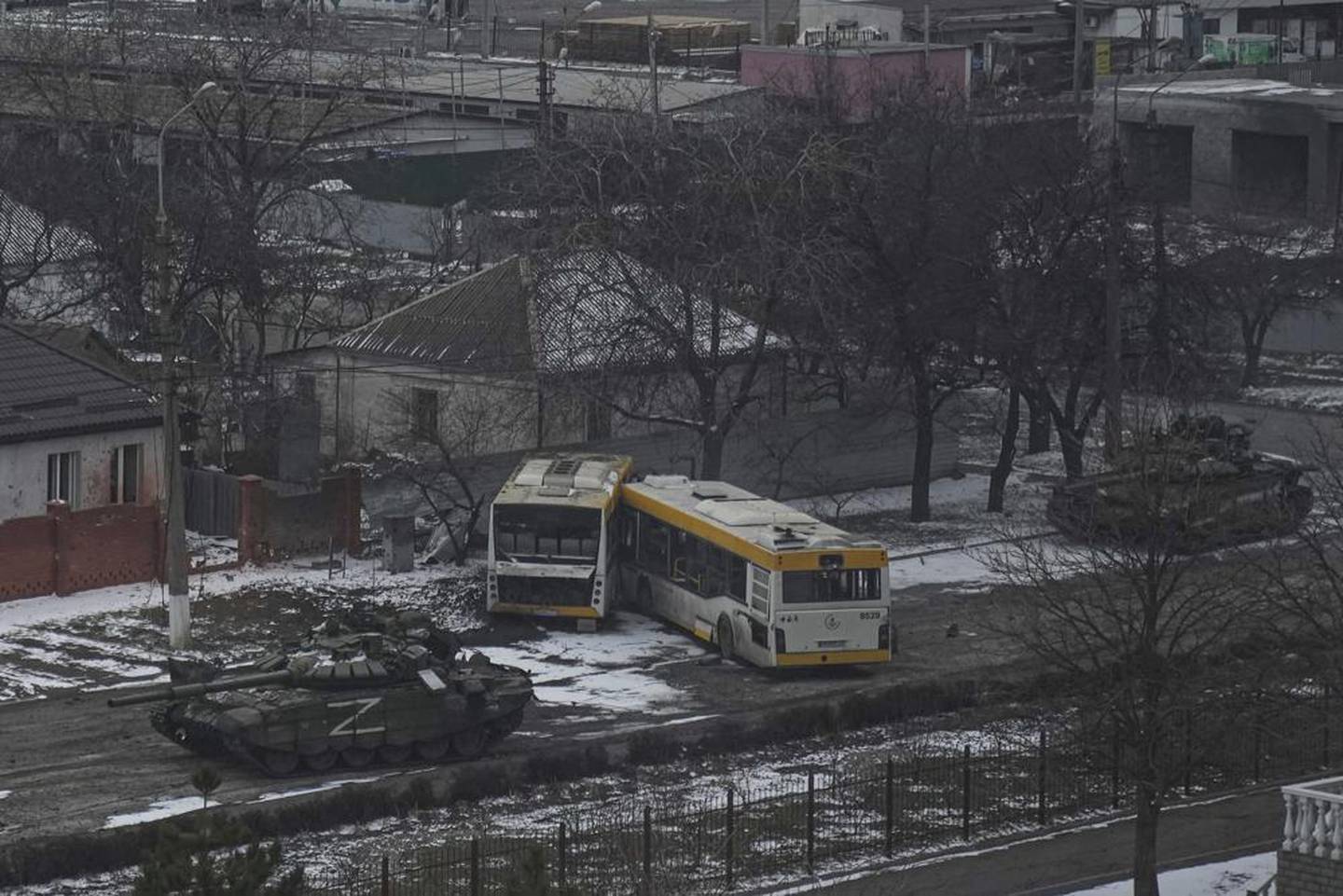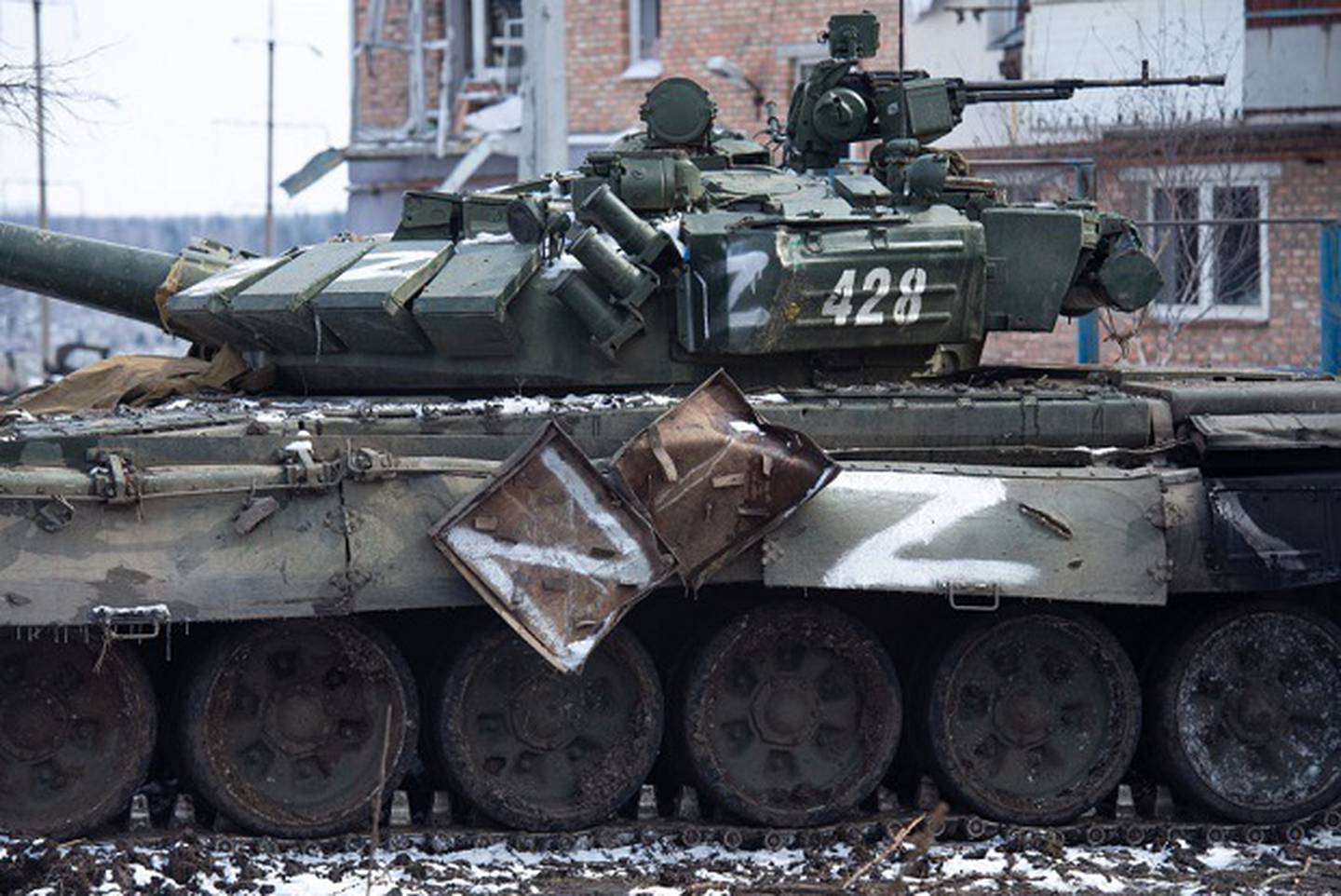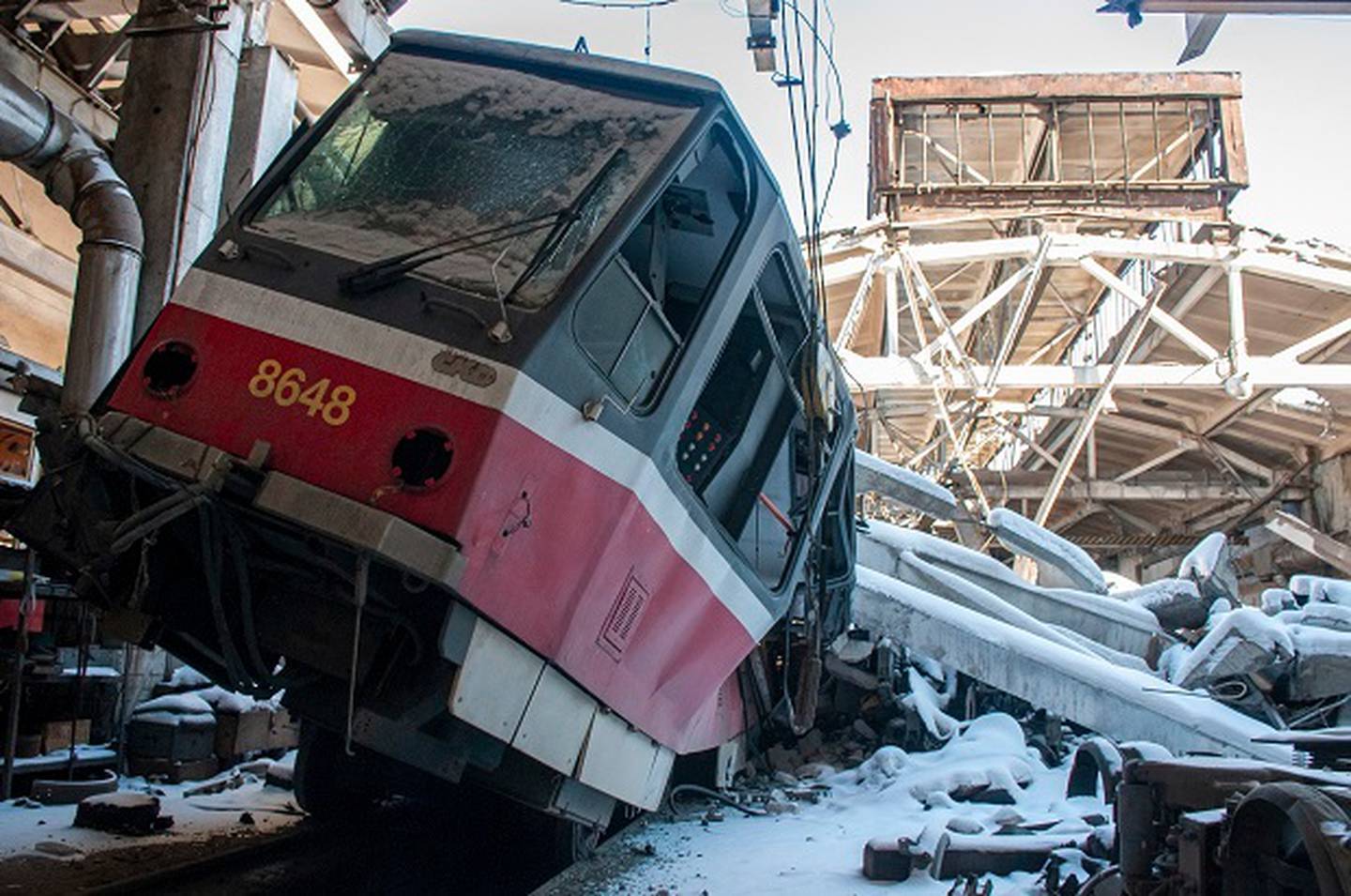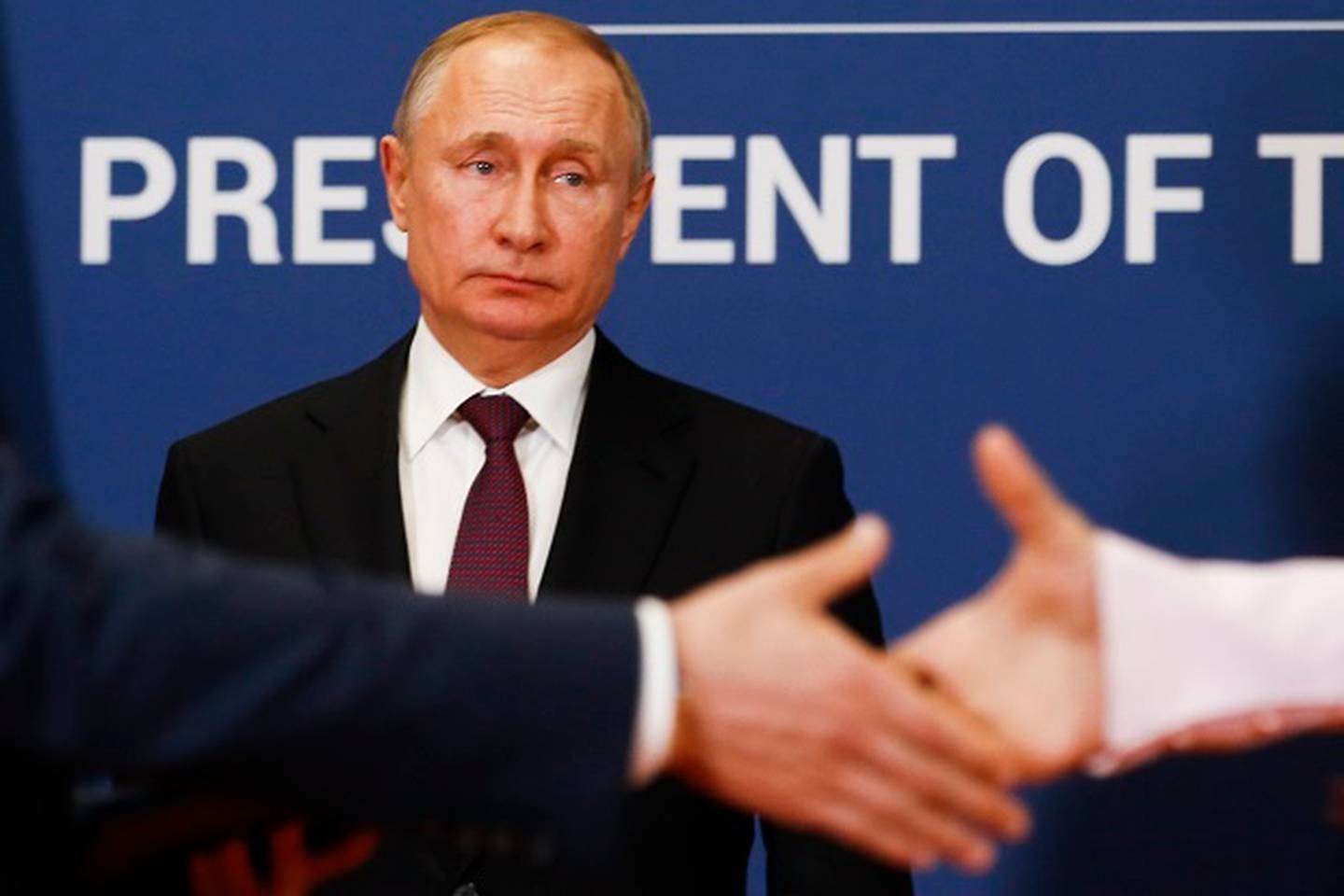President Vladimir Putin's invasion of Ukraine is destroying Russia's future and the country's people know it.
Putin can't win.
He may take Kyiv. He may occupy Ukraine. But his credibility is shot, his economy is in tatters, and he may want to take as many down with him as possible.
"This war is destroying is the future of Russia, and its people know it," says Dr Jean-Baptiste Vilmer, director of the Institute for Strategic Research (IRSEM).
What possessed the former Communist Russia KGB operative to launch his invasion is unknown.
What is known is he needed a fast – and total – victory.

Russian's army tanks move down a street on the outskirts of Mariupol, Ukraine.
Only then could the world be shocked into inaction. Any sanctions would be half-hearted. And the myth of the "chessmaster" would be entrenched forever.
He didn't get it.
"Putin now finds himself in a no-win position," Professors Stephan Cimbala and Lawrence Korb argue for the Bulletin of Atomic Scientists (who set the Doomsday Clock). "To achieve his original policy objectives, he must up the ante on the battlefield, which means higher levels of troop attrition, civilian casualties and property destruction."
He's losing troops, tanks and aircraft.
He's losing the clash of ideologies.
He's losing the propaganda war.
He's losing friends.
"Of course, this may create new dangers," the Bulletin professors say. "Putin knows history well enough to understand that autocrats who lose wars or get bogged down in costly military stalemates are expendable."
No easy way out
"He was willing to pay a calculated price for a gain, but he may end up having paid a much higher price than he imagined for no gain," says Vilmer. "A defeat in Ukraine could mean his downfall in Moscow, but so could continuing. He is caught in a trap of his own making."
Putin could change his mind.
After all, he is an autocrat. His word is law.

A tank of pro-Russian separatists is seen in the pro-Russian separatists-controlled Donetsk, Ukraine.
But public unrest is growing. Hopes are his billionaire collaborators are upset. The widespread fallout of international economic sanctions could push him to negotiate a ceasefire.
"In this scenario, Putin would present this outcome advantageously, but no one would be fooled," Vilmer says. "This outcome would be a bitter failure for him personally and for the Russian armed forces."
He could settle for what he's gained.
Consolidating his grip on Eastern Ukraine would at least be spun as a victory. The Russian-speaking peoples living there was supposed to be why he attacked in the first place.
READ MORE
- Ukraine says Russia strikes large military base near Polish border killing 35 people
- Ukraine-Russia war: Worldwide condemnation after Russian tanks apparently fire into residential block of flats
- France says Putin not ready to end Ukraine war as fighting rages near Kyiv
- Why global companies are putting profit at risk and racing to get out of Russia
But that leaves Western Ukraine standing. It will join the European Union. And NATO.
"Putin will have accelerated the expansion of the Western security architecture that he wanted to prevent," Vilmer observes.
Putin could push on.
But the fighting could continue for weeks. He could up its intensity – with even more firepower directed at Ukraine's cities and infrastructure. Tens of thousands of soldiers and civilians could be killed to break the nation's will.
He's done it before. Such brutality is a hallmark of Russia's fighting in Syria and Chechnya.
He may even seize Kyiv and all of Ukraine.
But what does he get?
The 'cornered rat'
"Russian troops are likely to face daily resistance," says Vilmer, comparing the scenario to the recent US and Nato experience in Afghanistan. "An occupation would therefore be extremely costly, both economically and politically.
"So, Putin lost, but it does not mean we win," says Dr Vilmer. "He knows that he cornered himself, and this is precisely where it gets dangerous because he may think that the only way out for him is to escalate."
It fits his personality.
It fits his self-inflicted circumstances.

A destroyed tram damaged by shelling, at a tram depot, in Kharkiv, Ukraine.
"As Putin becomes more isolated, he may consider launching 'limited' tactical nuclear weapons out of desperation," the Bulletin political scientists warn.
Everything depends on how secure Putin feels himself to be.
And his judgment isn't looking good.
"He has over-estimated his forces in Ukraine and underestimated the international reaction – he is losing control of the situation," says Vilmer. "Putin may want to regain the initiative by escalating. He may actually think that the only way out from this mess for him is to escalate."
It could give him a "win" to hide behind.
He could down a slew of satellites – claiming they have been assisting Ukraine. He could cut undersea internet cables and cripple the global economy.
This would give Putin a diversion. A victory that could hide his defeat in Ukraine.
"Putin may be willing as a last resort to use a tactical nuclear weapon," Dr Vilmer warns.
That would require a plausible 'trigger'.
And he appears to be laying the groundwork for just such an excuse.
There are his unfounded accusations of Kyiv building a "dirty" radioactive bomb. Now there's the claim Washington used Ukrainian laboratories to develop a coronavirus from bats as a biological weapon.
"In a risky 'escalate to de-escalate' move, Moscow would signal its intention to go all the way – hoping to stun Nato and assuming that it will not dare to escalate," Vilmer warns.
Putin may push his luck too far.

"The worst-case scenario is improbable but not impossible, as is the risk of a major war in general," he concludes. "As Putin is visibly locked in a paranoid and hubristic delirium, nothing can be excluded. It is also in this tragic sense that this could be the beginning of the end."




